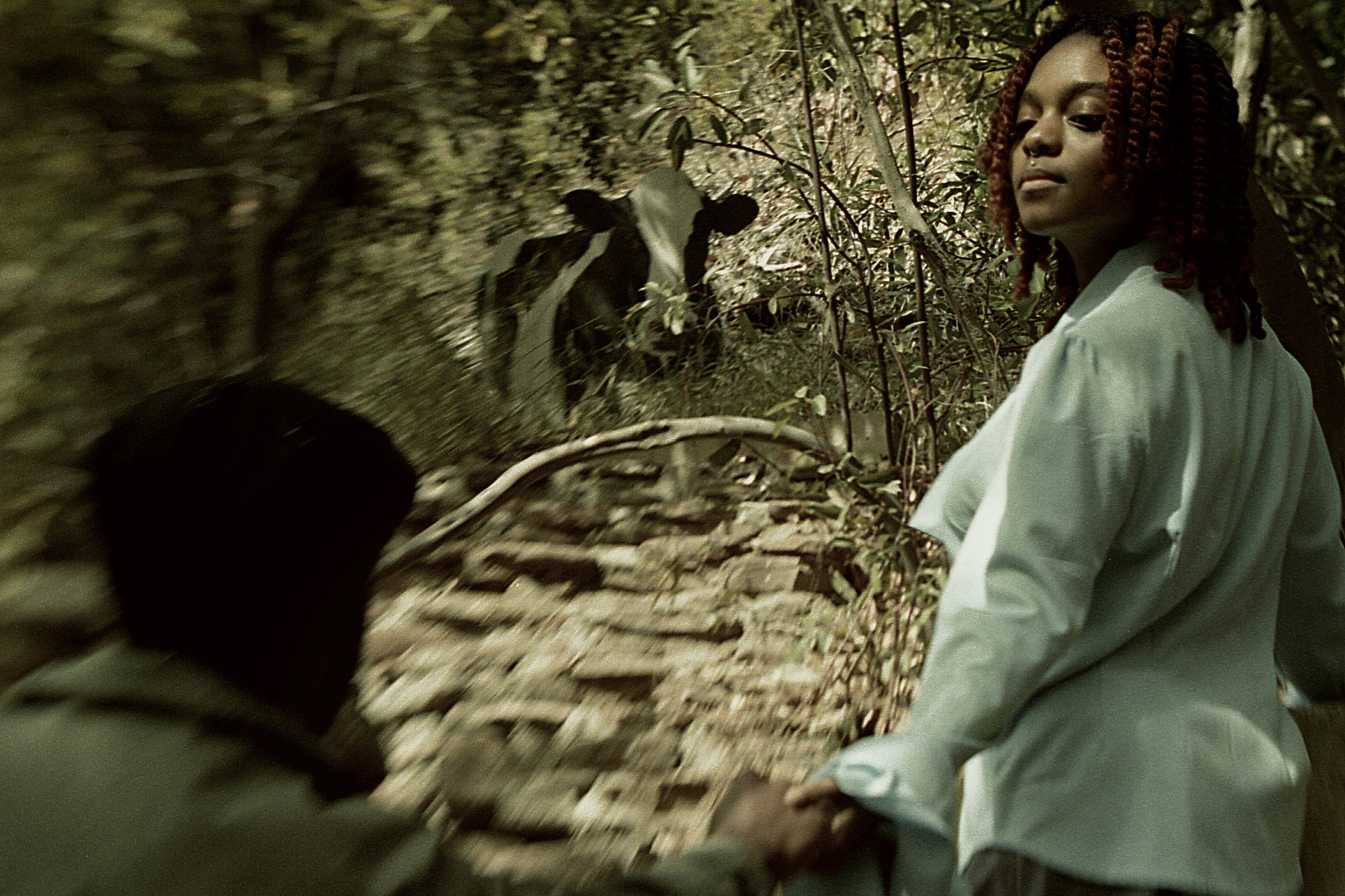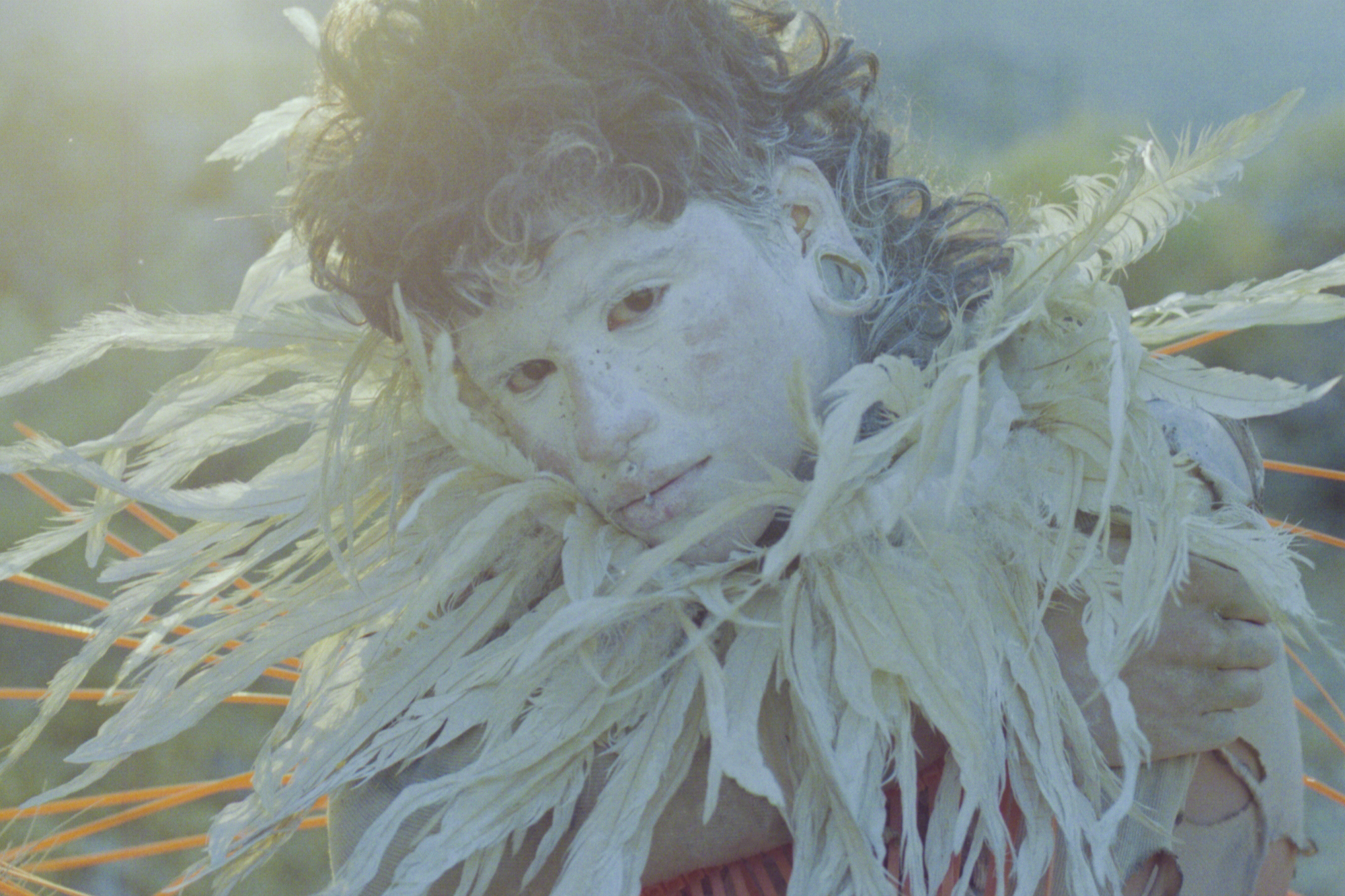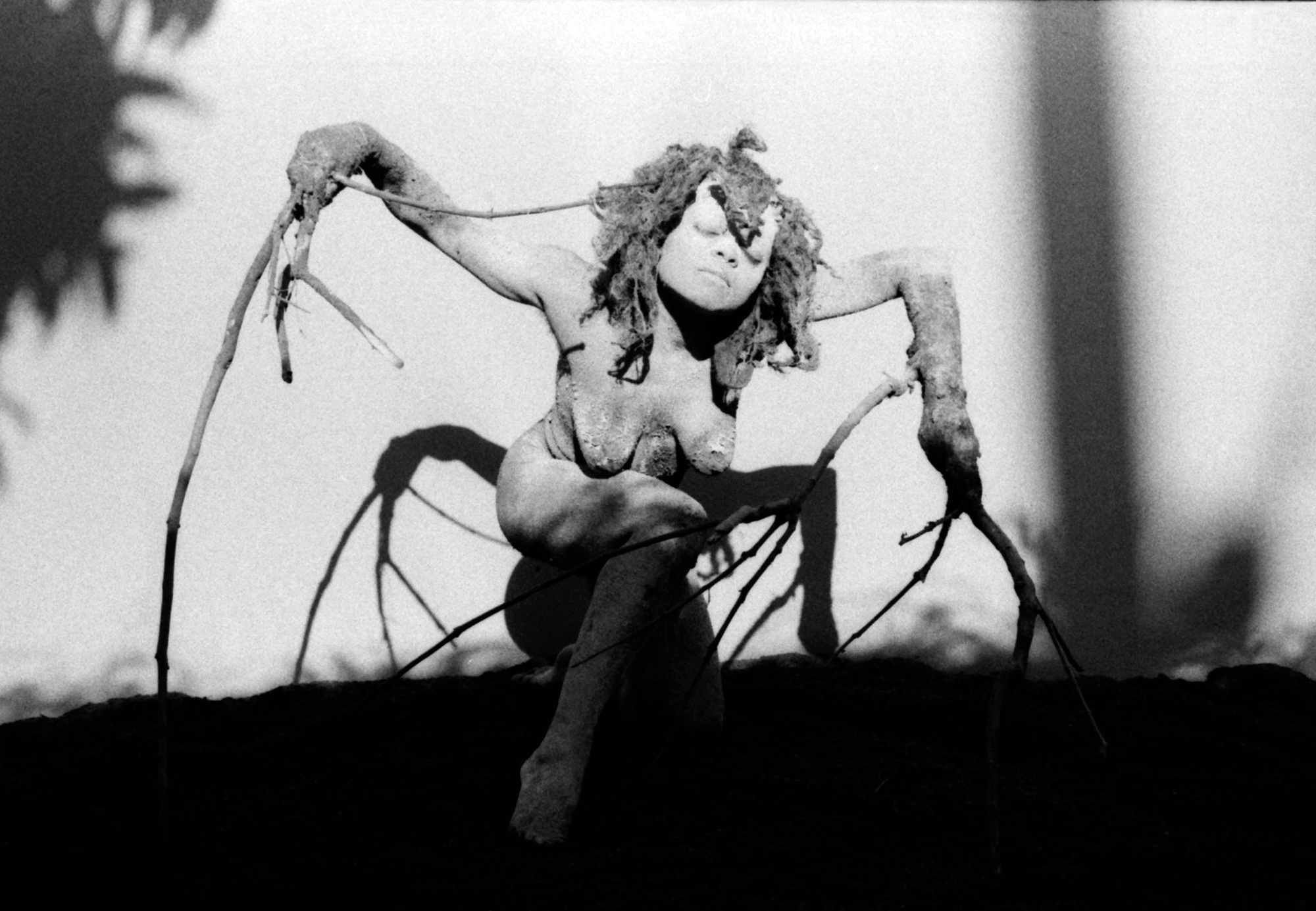
The Hedley Kow
TEXT ANYA JOHNSON
35 MM TYLER HUBBY PERFORMANCES JEREMY QUANT & KYLA CARTER
CREATIVE DIRECTION FARIDA AMAR
It was a queer hour. In or around even-set the fog rose and poured through the cleft in the hills to mass in fallow fields of cardoon carcasses. It seized up and rolled with precision over the footpaths, shunting the hills into a cold, cottony silence. It was precisely at this hour that we saw the Hedley Kow.
We had stopped at a lookout point and were peering through the fog for signs of the cat. The damn thing had been hunting again and coyotes were spotted in the foothills frequently after dark. Martin was worried over the light going and a keening desperation had entered his voice that, since we were children, I had been powerless to ignore. Before mum died, she had started taking in strays from the canyon. They had all run off except Peg, her constant, watchful companion. I didn’t care much what she did—Peg was prickly, even for a cat; there was something in her copper-flecked stare that struck me as soulless. Martin, however, had become devoted to her during those last few months, as he watched mum collapse into herself, the cat the only other body he saw for days at a time. I sat heavily on a bench and closed my eyes to the dense treacly pall that licked our skin.
A rapid thudding pealed through the fog and I twisted in my seat to find a cow running down the hill dead towards us. Martin grabbed my arm and pulled me up, putting the bench between us and the beast. It shuddered into stillness an arm’s breadth before collision and fixed us with a wild stare—its eyes were alert and fey, nothing like the herd animal’s usual milky gaze. Hardly blinking, the beast began to stalk us round the knoll.
“Do you think it’s mad?” I asked Martin, keeping my eyes on the creature.
“Mad cow, mad?” he returned, grip ratcheting tighter.
“I don’t know, any kind of mad.” The cow’s ears were perked and flapping urgently. It seemed to understand us.
Without ceremony the cow plunged back into the fog at a bovine gallop, tearing away into the valley below. Martin exhaled loudly and sent up a plume of icy breath. My heart was drumming away and a sharp whiff of cold sweat and fear vexed the air. We laughed thinly, alarmed and feeling foolish, and watched as the beast zig-zagged through the valley, occasionally stopping to look back at us.
“Must’ve been the Hedley Kow.” Martin nodded at the retreating shape. He flushed abruptly and stamped his feet as if to change the subject.
I was astonished he remembered—the Hedley Kow was one of many stories mum told us to keep us out of the hills behind Grandma Wildman’s. As it goes, a demon would don the skin of a cow and lead an unwitting farmer or widow on a long chase into the woods. Sometimes the bogie would appear as a different beast or even a household object—once it became a chest of golden coins and so lured an old woman off the road to her death. Lost and travel-weary, the beguiled prey would meet some misfortune, or else the Hedley Kow would shed its glamor and beat them senseless. I wasn’t cold anymore and I hummed a tune that rose from memory like so much water:
My father he was hanged
My ma drowned in a well
And now I’se left alone
All by my own sel.
A horrid yellow yowling echoed from deep in the valley and Martin startled badly.
“Fuck off, Margaret,” he swore nastily at me and stalked off in the direction of the noise, intent on retrieving the cat. I didn’t think it prudent to mention that we were now following the trail of the Hedley Kow.
Grandma Wildman always laughed when she sang the song about the well, even though I thought it rather terrible, and mum hit me once for singing it. She was the opposite of her mother in nearly every way. Gran laughed loud and often, smoked cigarettes, and filled Martin’s and my days with folktales from the northern counties. Although she emigrated when mum was small, Gran took pride in her rustic customs, teaching us the wheel of the year and how to weave good-luck garlands out of rosemary and devil’s-bit. When she had one of her bad spells, we stayed weeks at a time, taking care of the house, the chickens, the garden. I would take charge of Martin, ordering him to boil the kettle and bruise herbs for a healing tincture.
Martin never liked the chores I assigned him, preferring to help mum around the house or reread old comic books, oily with fingerprints. Once, when Gran had been bedridden for longer than usual, I took Martin to the edge of the hills to gather echinacea flowers. He sulked while I grubbed around on my hands and knees, the overlarge Gunne Sax dress Gran had cropped for me getting soiled in the mud. Martin sulked, refusing to help. I righted myself, wiping my hands on my front and pulled on his arm. His knees buckled and hit the mud, a wail immediately rising in his throat.
“I hope the old witch dies,” he whimpered, his face crumbling with the ill wish.
“Don’t you ever!” I screamed. I gathered my skirt full of weeds and ran back to the house to tell.
Mum gave a cold little laugh when she heard the lie. “She’s not a witch, Margaret, she’s brain-sick. Same as great-grandma Wildman: only a nutter drowns in a well. We keep her out of charity.”
When I got back to the gate, out of breath with tears, I threw one leg after the other over the rusted rungs. I had never disobeyed mum’s order not to go into the hills alone. In the muckyard, I dodged horses’ hind legs and ran past the stables into the sparse forest. As I ran, the tree cover became denser, and I stumbled once or twice on the narrow footpaths. I lost a sandal in the sucking mud surrounding a water trough and kept on, blind from anger.
Out of breath, I stopped in a copse of eucalyptus and chaparral, studded by skeletal palm trees. I was at the foot of a well, boarded up and choked with grass. Blinking back tears, I surveyed the bones of a large structure, now deserted. A bronze plaque stood nearby. It read: Site of the Belgum Sanituriam. Below it was a wooden cross engraved with the names Dr. Hendrick Nelson Belgum and E. Wildman. It was the year my great-gran had died. I knew then that what my mother had said was true. I also knew, from that day on, that I was on Gran’s side, that Martin and mum existed on the other end of some invisible divide.
A moon was up and the gloaming was starting to play tricks. I swung my pack around to dig out a flashlight. Small animal sounds mirrored my steps on both sides of the path, accented by the occasional snuffling of a larger, hidden beast. Ghastly, burn-scarred eucalyptus trunks loomed out of the darkness and I imagined escaped lunatics stooped in them, sheltering from the woods. All the old stories Gran told us when we were wee came back in the dusk to wink at me.
A strangulated cry ripped the air in front of me and I started to run. The weak fissure of my flashlight bounced manically from side to side. It was true dark now.
“Martin!” I shouted, my voice too loud, too easy. He was standing in profile at a fork in the trail, looking down. “What is it?”
“Coyotes,” he replied, pointing to tracks in the loam, “they got her.”
I thought it best not to point out that the prints were too big and too deep to belong to a coyote. Looking up, palm fronds cast black stripes on the sky. A memory pang hit me, and, to my left, I saw the squat shadow of a well. I could tell him now, I thought, knowing mum had kept the family infirmity from him.
That was when an odd thing happened. The glade rippled in the moonlight and a figure you could only see in a squint lumbered past the well towards us. Its shadow widened, sprouting horns as it advanced. Any moment it would shake off its hide; I looked at Martin but he had fixed his eyes to the ground, searching for traces of Peg. For the first time, I wished I was out of the hills, safe. A thin meow passed out of the shadow: it contracted around a tabby cat which ran to Martin, curling around his legs as she hummed. Martin scooped Peg up and buried his face in her fur, stifling a sob.
“It’s alright now, love,” I took his arm gently, “Let’s go back.”
We walked back the way we had come, under a half blind moon, not saying much.
You may also like
Firebird
You know the photographs of the dead in heaps, tangled in each other’s arms? Even when I was whol
George the Raccoon
My grandparents moved into a roomy, craftsman-style four-bedroom house at the bottom of Mount Tamalp
The Carrier
The girl placed the metal bombilla straw in her mouth and took another sip. As the warm liquid snake




